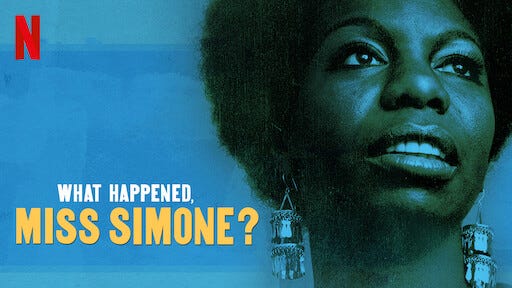Inspiration > Perspiration
A musician-activist, an industry facing challenges, and a cancer survivor walk into a bar...
A bit of housekeeping to share.
I’ve now released this newsletter every Thursday morning at 8 am, without fail, for 17 weeks. But new issues may be less frequent in the coming days.
Nothing in particular has changed on my end, I just want to give myself more freedom to allow inspiration to drive my writing rather than a hard (self-imposed) weekly deadline.
Also, in using so much of my available time on non-stop media consumption, I’ve discovered that my brain needs more quiet in its diet.
On a less rigid schedule, I stand a much better chance of remaining thoughtful, engaged, and joyful in my observing, digesting, and writing. If I can’t be and do those things, then there’s no point to this endeavor at all.
So some future editions may arrive on the usual schedule and some may take a bit longer.
I truly appreciate the support, feedback, and recommendations you’ve given me these past few months, especially as the newsletter has evolved into something more personal than originally intended. The response I’ve gotten has warmed my heart.
So, many thanks to you all, and I look forward to bringing you further issues of The Best Newsletter as often as inspiration allows!
On to the list…
The Best…
…Documentary I Watched This Week
What Happened, Miss Simone? (2015) — Directed by Liz Garbus
Streaming on Netflix
She said my name’s Neil Schon but people call me Nina Simone
Some people call me Andre Cymone
’Cause I survived the ’80s once already
And I don’t recall it all that fondly
So hold steady
I probably first heard these esoteric lyrics — from the song “The Swish” by The Hold Steady — in 2006 or 2007. I don’t ever recall hearing Nina Simone’s name before that.
Another 15 years went by before I saw her in Questlove’s Summer of Soul documentary. I remember seeing her indelible performance and thinking, “Nina Simone — holy shit.”
And yet I STILL didn’t bother to learn about her story or dig deeper into her music.
Well, now I’ve finally seen the 2015 documentary What Happened, Miss Simone? and I understand some of my ignorance.
As a suburban white kid growing up in the 1990s, the chances were pretty good that Nina Simone wouldn’t exist for me.
By 1970, the brilliant singer-pianist-songwriter had largely been chased out of mainstream American pop culture. For a variety of reasons, she was deemed too dangerous, too militant, too tortured, too unstable for mass consumption. Perhaps most of all: too Black.
Meanwhile, her soul was too fragile and too vulnerable to survive her era intact, and she would spend the last three decades of her life outside the U.S., essentially in exile.
So for someone like me, who came of age long after she had come and gone as a cultural icon, she never hit the radar.
Filmmaker Liz Garbus’s What Happened, Miss Simone? filled that gap for me, and I’m sure has enriched the experience of those who were previously aware of Simone and her work.
The film does an admirable job of telling her complicated story and putting her life in context. Most important, it amplifies her unique artistry — though the film left me wanting more of her music.
I wish I hadn’t waited until middle age to learn about Nina Simone’s story, appreciate her work, and understand her place in American cultural history. But I’m thankful that I now know better.
Thanks to reader Mark L. for the nudge.
…Business Story I Read This Week
“TV’s Streaming Bubble Has Burst, a Writers Strike Looms, and ‘Everybody Is Freaking Out’” — By Joy Press and Natalie Jarvey, Vanity Fair, May 1, 2023
I don’t usually write about business stories, but this one drew me in because I lived aspects of it at NBC.
In this cogent and insightful piece, writers Press and Jarvey explore the situation Hollywood is facing regarding the rise of streaming, the ongoing decline of traditional entertainment distribution, and the writers’ strike.
What’s of particular interest is how the explosion of streaming programming has impacted the people who produce that content in surprisingly negative ways.
In my experience at NBC, I watched for years as the company used its still sizable revenues from broadcast television to fund its foray into streaming — especially once Peacock was announced in 2019 and launched the following year.
In other words, the company was propping up a new streaming service’s fragmented and small viewership at the expense of the NBC network, which still generated comparatively large and broad audiences.
The strategy was understandable from the perspectives of “the future is in streaming” and “everybody’s doing it.” No corporate leader wanted to be perceived on Wall Street as behind the technology curve in this era of changing viewing habits.
But as time wore on, some of us wondered, “Is streaming an actual business?”
As this story explains, the outlook is not great. There are too many different services, programming and talent are expensive, and audiences are comparatively small.
In the long term, it’s easy to envision a Darwinian future in which the weakest services get swallowed up or disappear altogether.
But for now, as Press and Jarvey explain, Hollywood and the major media companies seem destined to keep spinning their wheels in this uncertain atmosphere.
I just hope the people in charge can solve these challenges sooner than later and without decimating the entire creative workforce in the process.
…Op-ed I Read This Week
“U2’s Music Shaped My Life. Then It Helped Save It.” — By Theodore Kim, The New York Times, April 28, 2023
I enjoyed this bit of memoir by New York Times staffer Theodore Kim that was published in the paper last week.
The inclusion of U2 caught my eye, especially since the writer — who, while undergoing cancer treatments, requested that his hospital play the Irish band’s songs — mentions some of my personal favorites, like “Ultraviolet (Light My Way)” and “Every Breaking Wave,” as well as the band’s greatest triumph, “Where the Streets Have No Name.”
But the specificity of the band is incidental to the piece’s message, that music has the power to soothe, to transport, maybe even to help heal.
I recognize that this isn’t an original idea.
But I think there’s value in putting yourself in Theodore Kim’s shoes, of facing the prospect of a scary medical diagnosis or procedure and wanting something familiar or uplifting to help you through it.
Maybe you’ve been there before, maybe you haven’t. Either way, I bet there’s a band or an album or a piece that you’d want plugged into your brain to help stave off the fear, even if only for a few moments.




